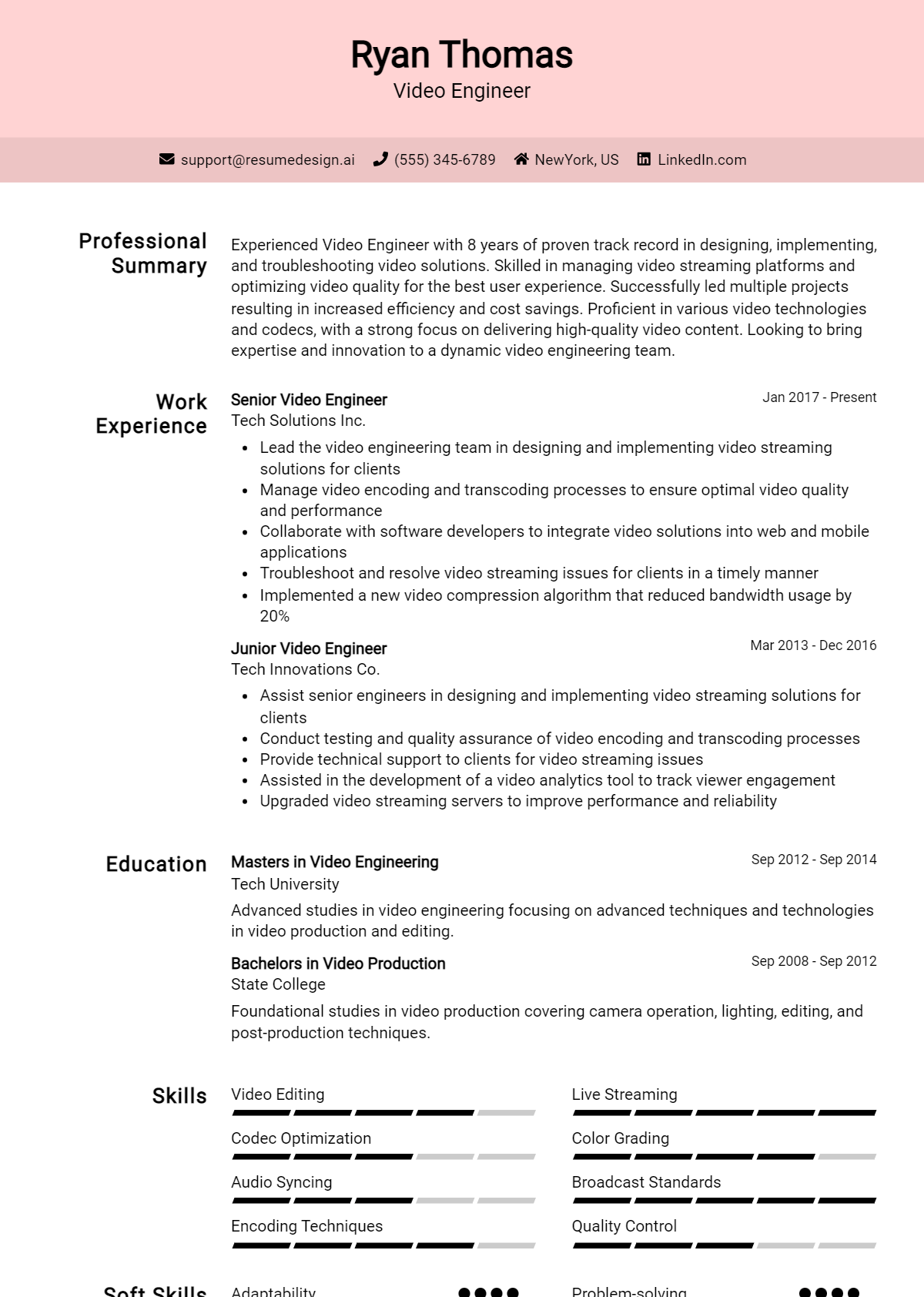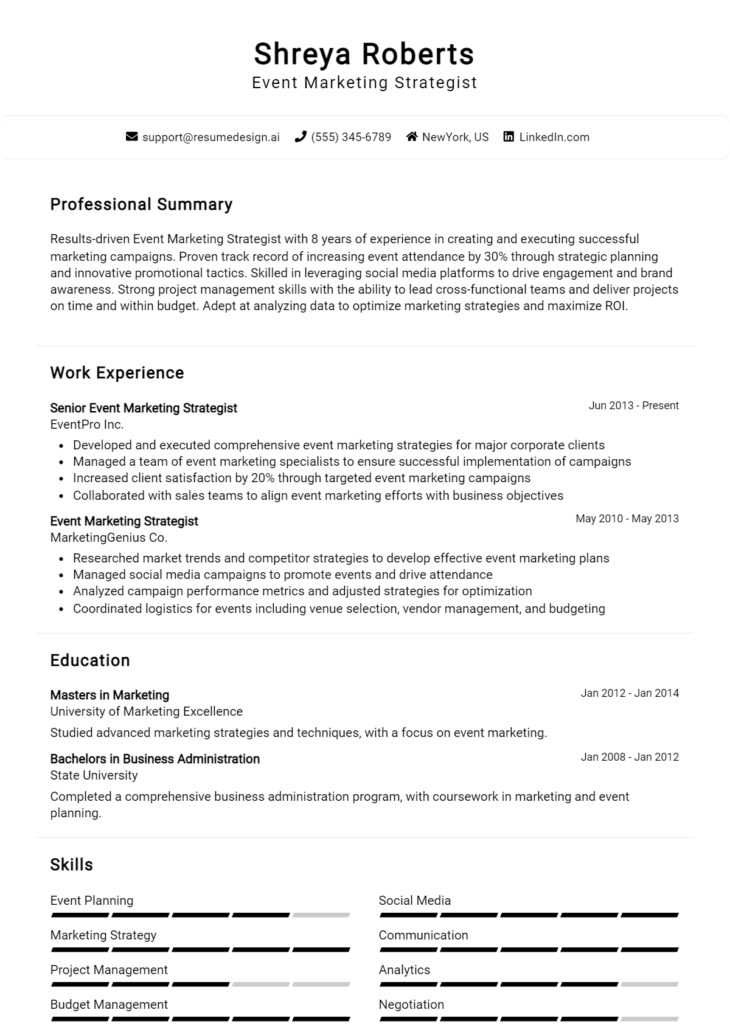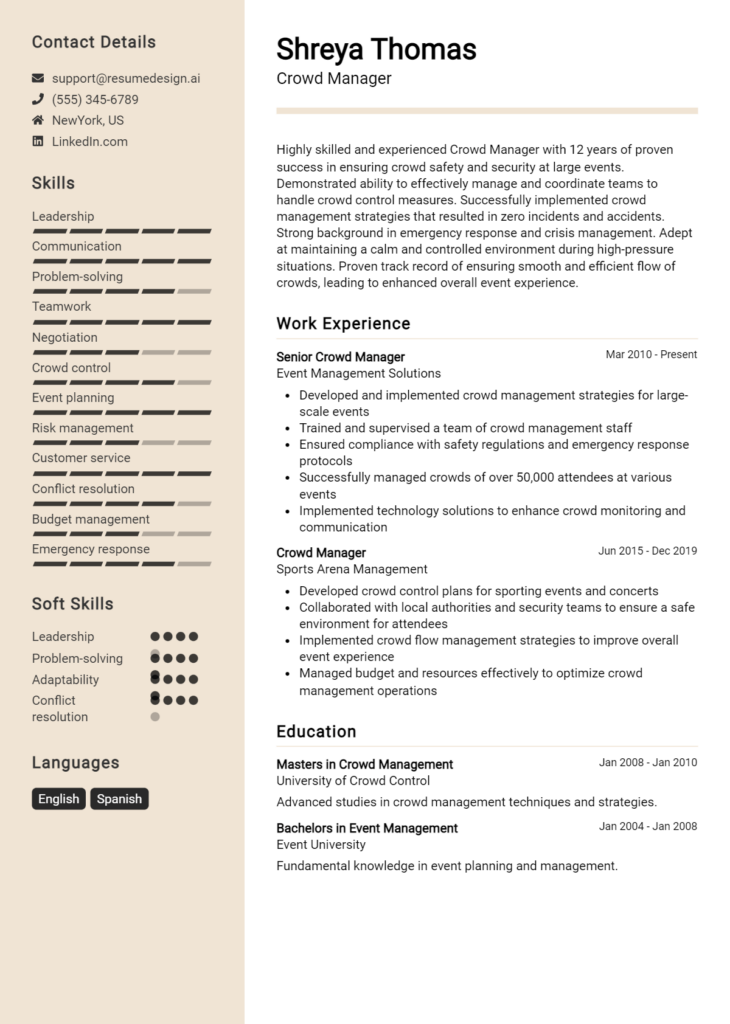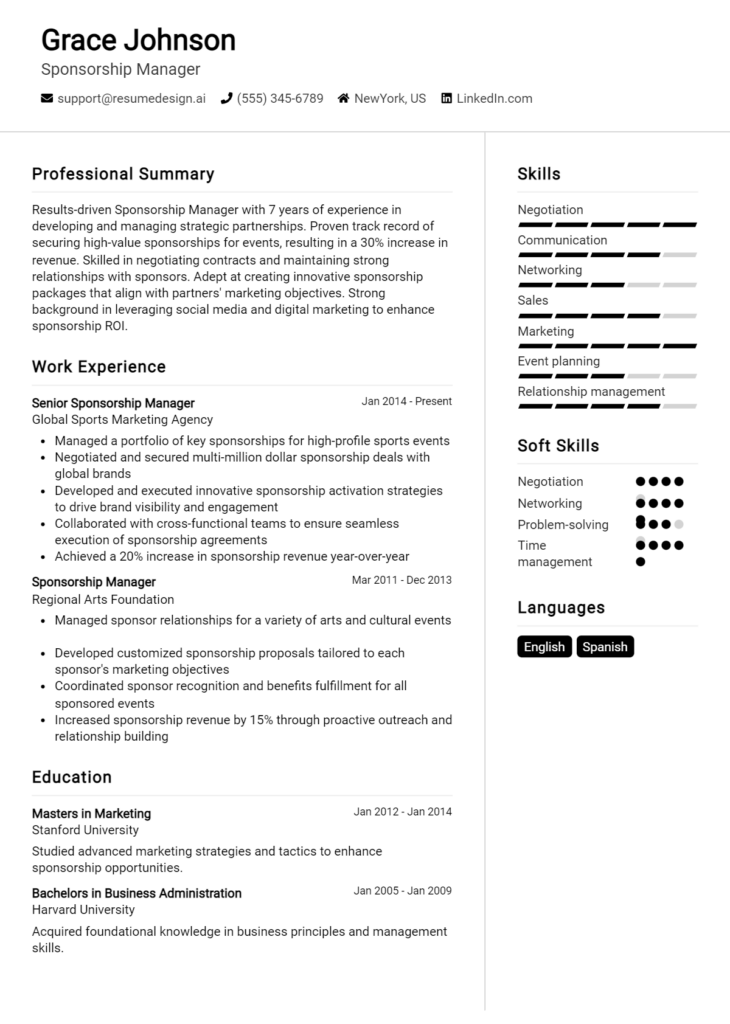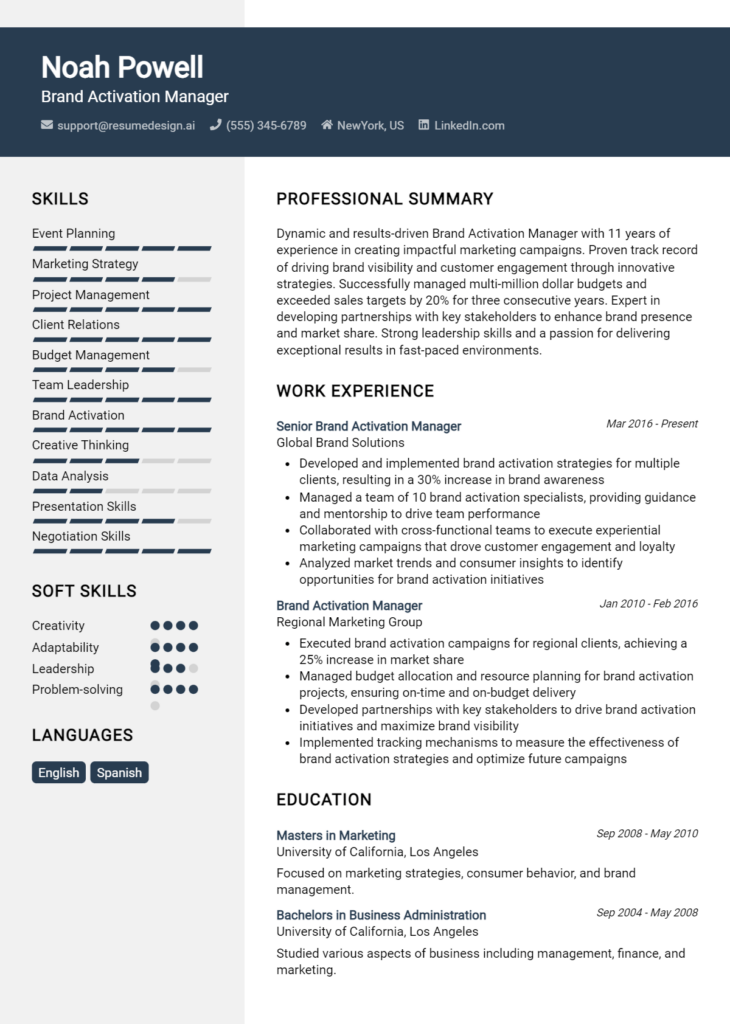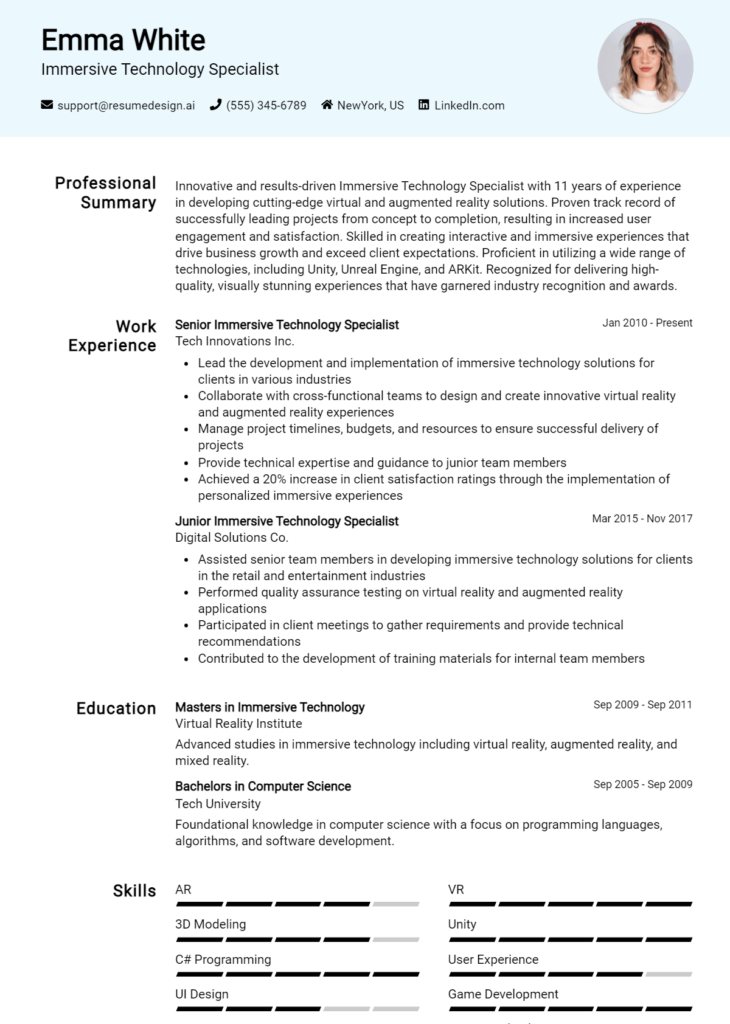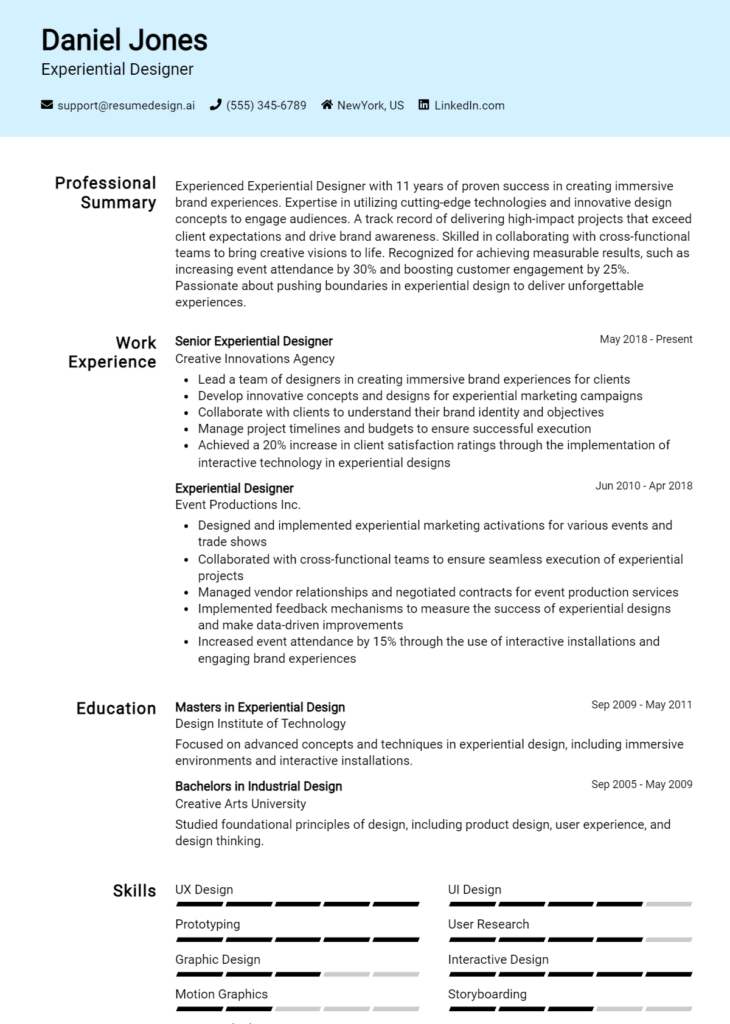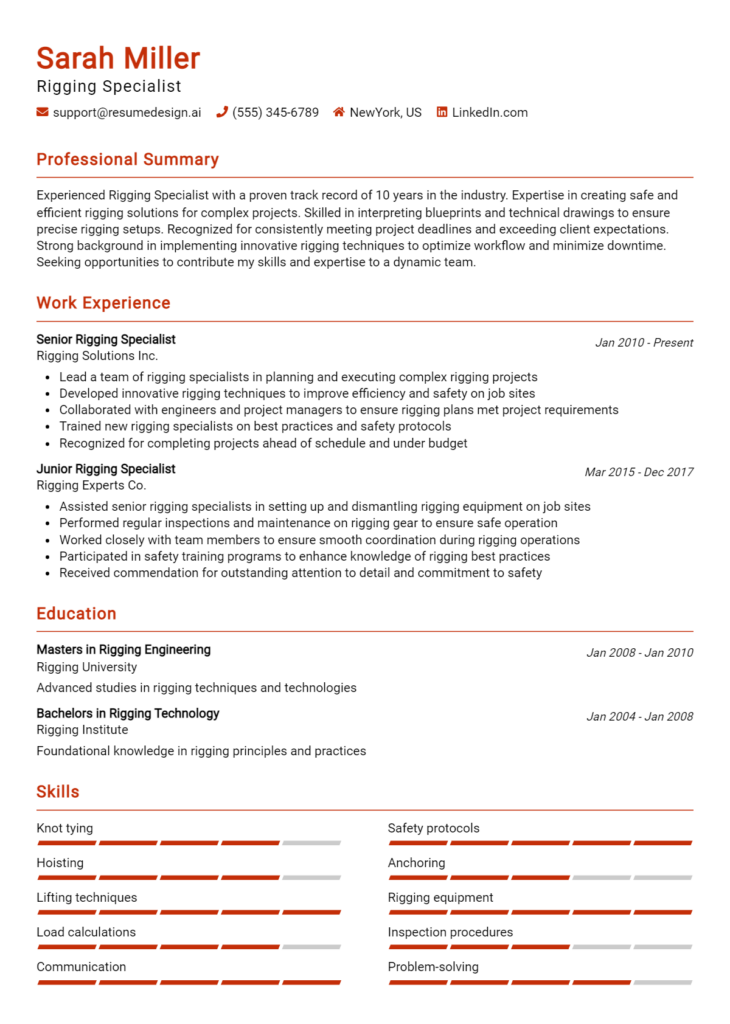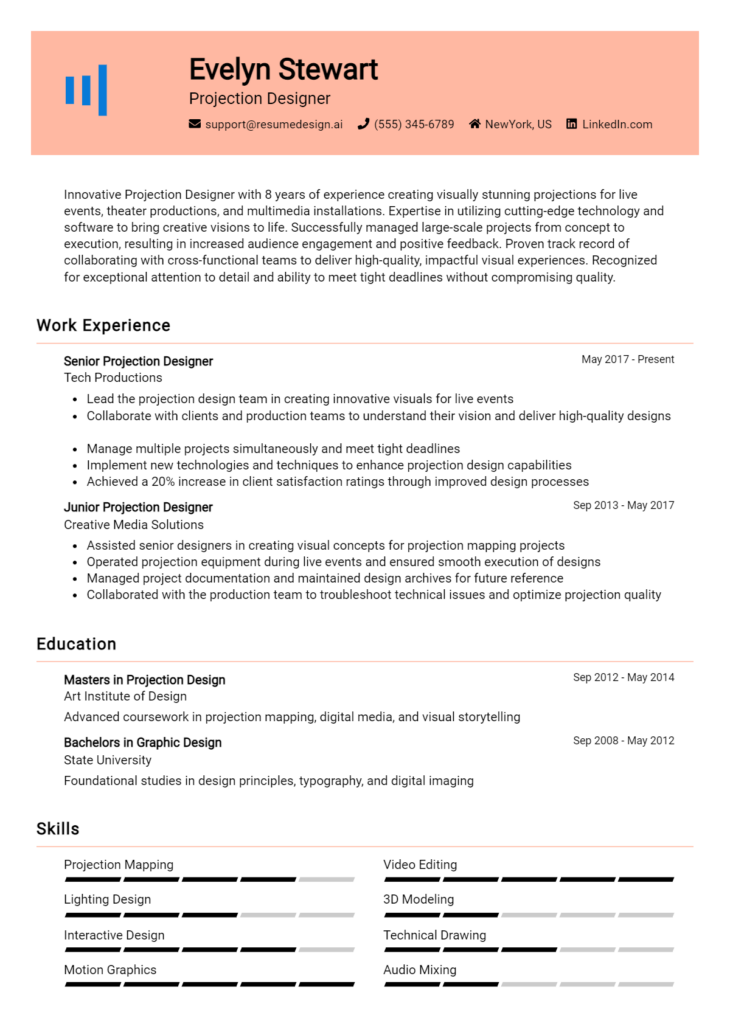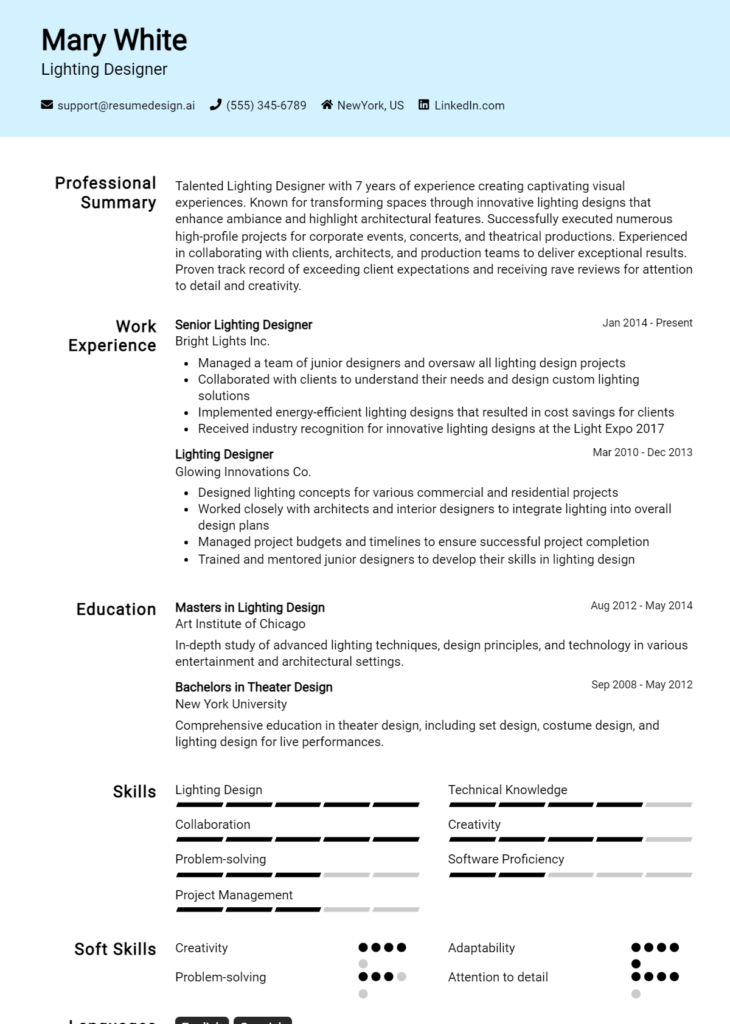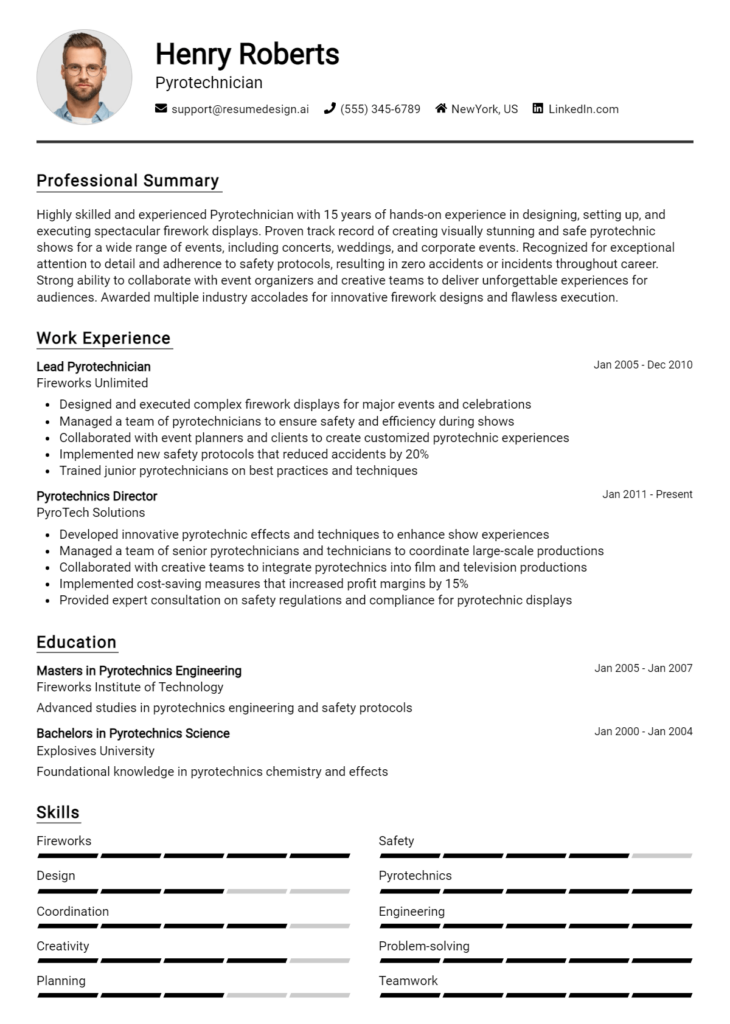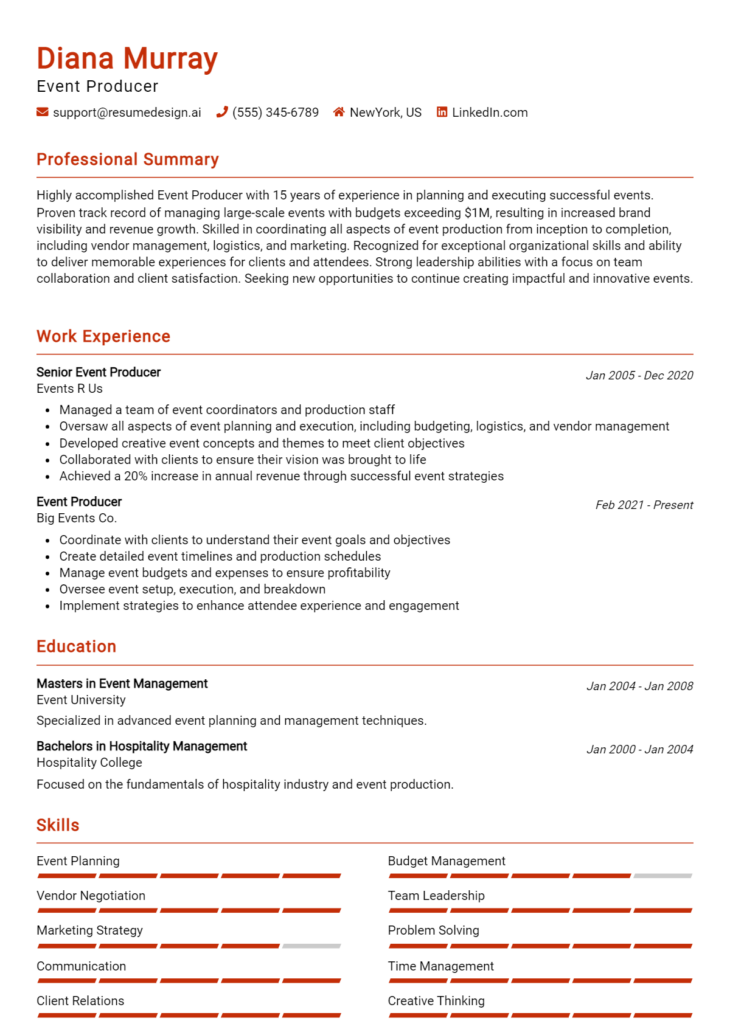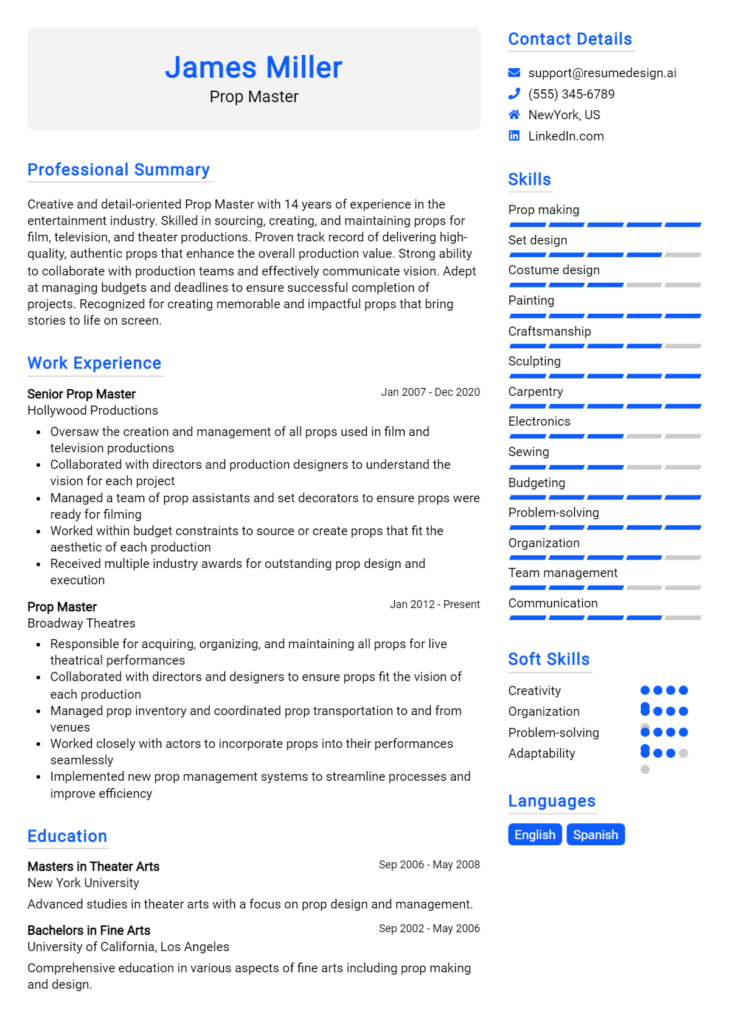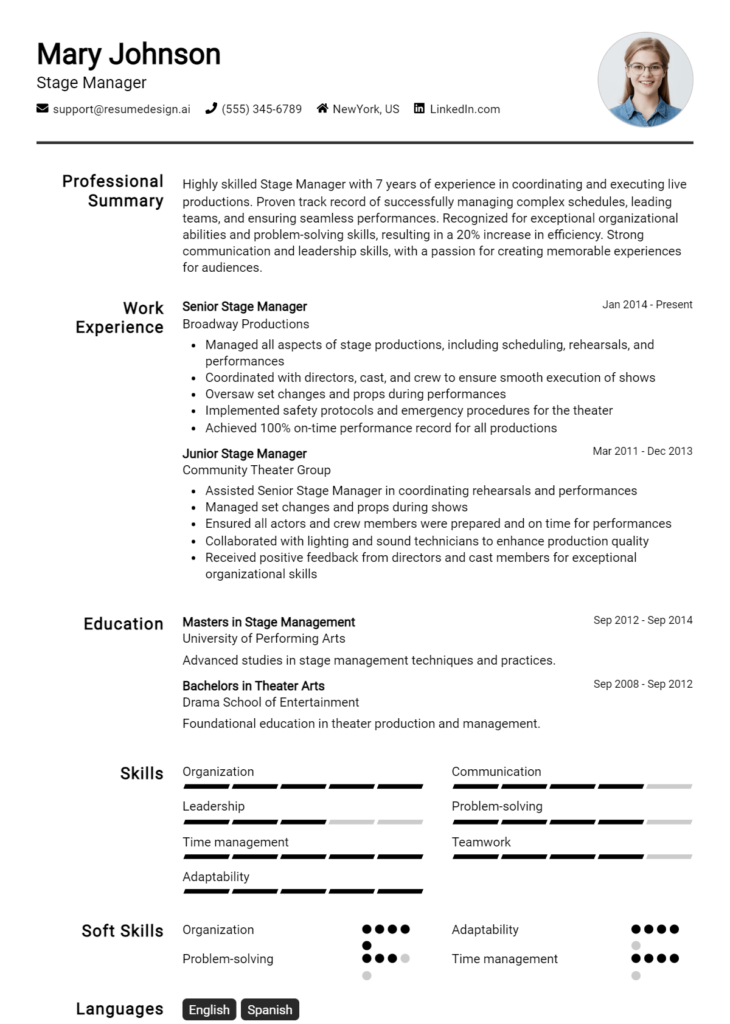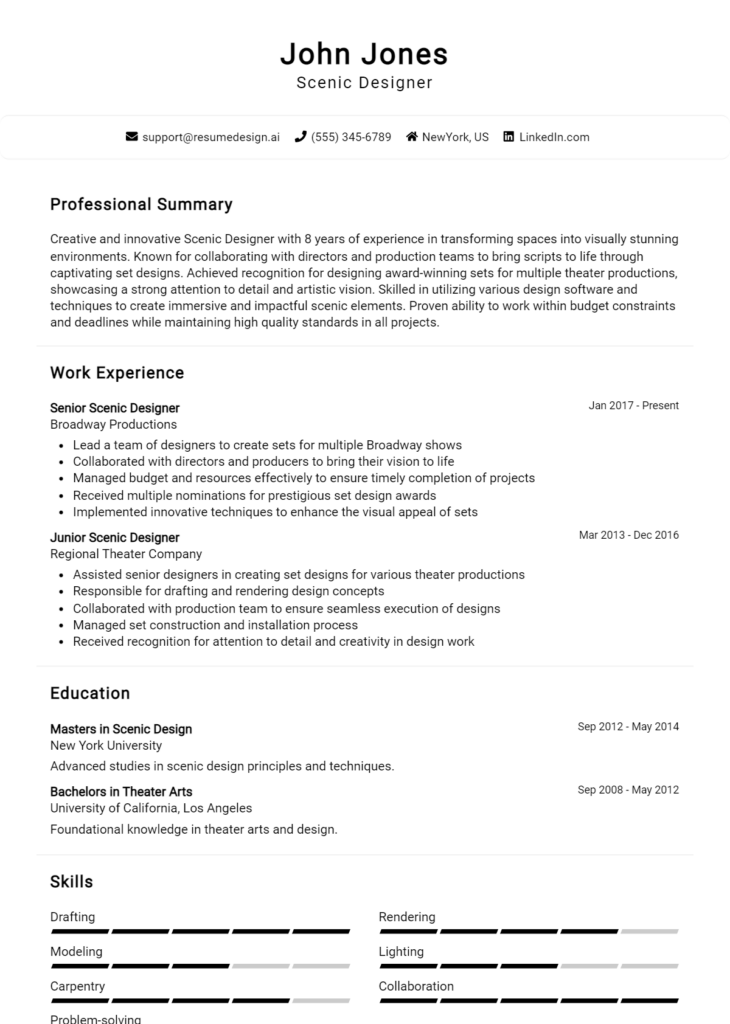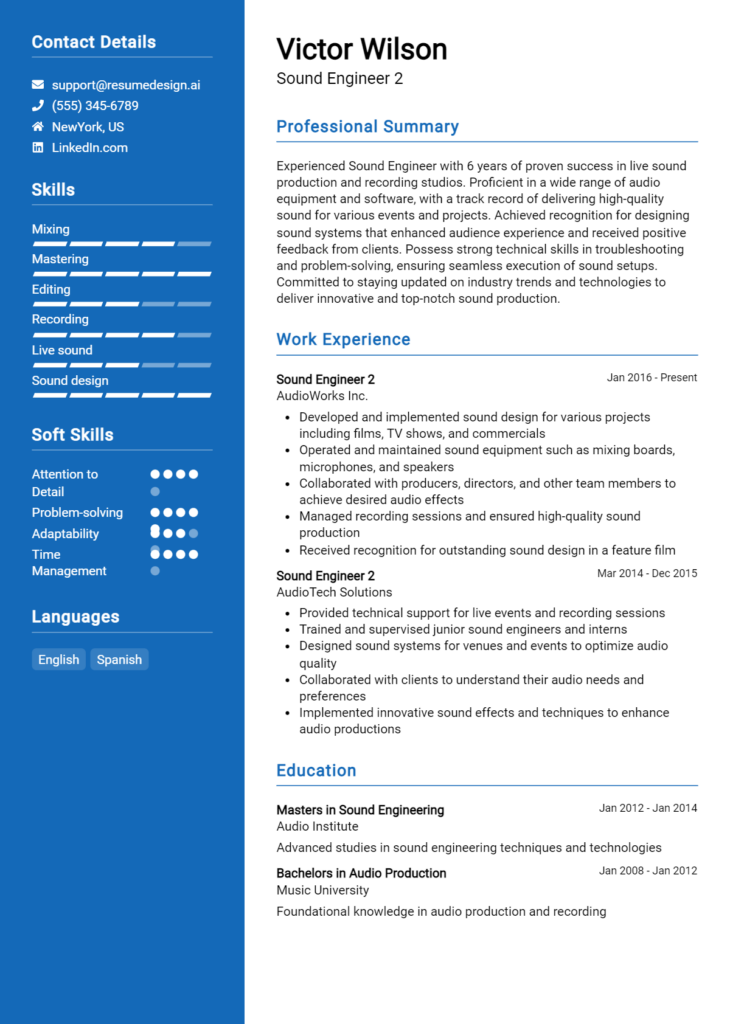Video Engineer Core Responsibilities
A Video Engineer plays a vital role in the production and post-production processes, ensuring high-quality video output. Key responsibilities include operating and maintaining video equipment, troubleshooting technical issues, and collaborating with various departments such as production, editing, and broadcasting. Essential skills encompass technical proficiency, operational efficiency, and strong problem-solving abilities that contribute to the organization's overall goals. A well-structured resume effectively highlights these qualifications, showcasing a candidate's potential to enhance video projects and drive success.
Common Responsibilities Listed on Video Engineer Resume
- Set up and operate video recording equipment for live and recorded events.
- Monitor video feeds and troubleshoot technical issues during production.
- Collaborate with production teams to ensure seamless video integration.
- Perform video editing and post-production tasks using industry-standard software.
- Maintain and repair video equipment to ensure optimal performance.
- Implement and manage video signal distribution systems.
- Ensure compliance with broadcasting regulations and standards.
- Conduct quality control checks on video content before final release.
- Provide technical support and training to team members.
- Develop and maintain documentation for video production processes.
- Stay updated on the latest video technology and industry trends.
High-Level Resume Tips for Video Engineer Professionals
In the competitive field of video engineering, a well-crafted resume serves as a vital tool that can set a candidate apart from the rest. Often the first impression a potential employer has of you, your resume must effectively showcase not only your technical skills but also your achievements and unique contributions to past projects. A strategic approach to resume writing can highlight your qualifications in a way that resonates with hiring managers. This guide aims to provide practical and actionable tips specifically tailored for Video Engineer professionals, ensuring your resume commands attention and opens doors to exciting career opportunities.
Top Resume Tips for Video Engineer Professionals
- Tailor your resume for each job application by aligning your skills and experiences with the specific requirements listed in the job description.
- Use relevant keywords from the job posting to ensure your resume passes through applicant tracking systems (ATS).
- Showcase your technical expertise by including specific software and hardware you are proficient in, such as Adobe Premiere, Avid Media Composer, or Blackmagic Design products.
- Quantify your achievements by using metrics, such as the number of projects completed, reductions in production time, or improvements in video quality.
- Highlight relevant experience by focusing on your roles in various projects, emphasizing your contributions and any leadership positions you held.
- Include a section for certifications and training that are pertinent to video engineering, such as courses in cinematography, video production, or sound design.
- Incorporate links to your portfolio or demo reels to provide tangible evidence of your skills and past work.
- Utilize a clean and professional format that makes your resume easy to read, ensuring it is visually appealing yet straightforward.
- Keep your resume concise, ideally one page, focusing on the most relevant information that showcases your strengths as a Video Engineer.
- Proofread your resume multiple times to eliminate spelling and grammatical errors, which can undermine your professionalism.
Implementing these resume tips can significantly enhance your chances of landing a job in the Video Engineer field. By strategically presenting your skills and experiences, you can create a compelling narrative that captures the attention of hiring managers and positions you as a strong candidate for the role. A polished resume not only reflects your qualifications but also your commitment to excellence in your craft.
Why Resume Headlines & Titles are Important for Video Engineer
In the competitive field of video engineering, a well-crafted resume headline or title serves as a critical first impression for hiring managers. This brief yet powerful phrase can instantly capture attention and encapsulate a candidate's core qualifications, making it easier for recruiters to identify the right fit for their team's needs. A strong headline should be concise, relevant, and directly aligned with the job being applied for, showcasing the candidate's unique value proposition in a way that resonates with prospective employers.
Best Practices for Crafting Resume Headlines for Video Engineer
- Keep it concise—limit your headline to one impactful phrase.
- Make it role-specific—tailor the headline to the video engineering position you are applying for.
- Highlight key skills—incorporate essential technical skills relevant to the job.
- Use action words—begin with strong verbs that convey your expertise and accomplishments.
- Include relevant experience—mention years of experience or notable projects.
- Focus on results—emphasize achievements that demonstrate your impact in previous roles.
- Avoid jargon—use clear language that can be easily understood by all hiring managers.
- Revise for clarity—ensure the headline is easily grasped at a glance.
Example Resume Headlines for Video Engineer
Strong Resume Headlines
Innovative Video Engineer with 7+ Years of Experience in Live Streaming Solutions
Expert in Video Compression Techniques and High-Quality Streaming
Creative Video Engineer Specializing in Post-Production and Visual Effects
Weak Resume Headlines
Video Engineer
Experienced Professional
Strong resume headlines are effective because they immediately convey specific skills, experiences, and accomplishments that demonstrate a candidate's fit for the role. They provide a clear snapshot of the candidate's expertise in video engineering, enticing hiring managers to read further. In contrast, weak headlines fail to impress due to their vague nature; they lack the detail necessary to differentiate a candidate from the competition, ultimately making it easy for their resume to be overlooked in the hiring process.
Writing an Exceptional Video Engineer Resume Summary
A compelling resume summary is essential for a Video Engineer as it serves as the first impression for hiring managers. It quickly captures their attention by highlighting key skills, relevant experience, and notable accomplishments that align with the job role. An effective summary should be concise, impactful, and tailored specifically to the position being applied for, ensuring that it effectively communicates the candidate’s value proposition in a crowded job market.
Best Practices for Writing a Video Engineer Resume Summary
- Quantify Achievements: Use specific numbers to demonstrate your impact, such as the percentage increase in efficiency or the volume of projects completed.
- Focus on Relevant Skills: Highlight the technical skills that are most relevant to the job description, including software proficiency and technical expertise.
- Tailor for the Job Description: Customize your summary to reflect the key requirements and duties of the position you are applying for.
- Use Action Verbs: Start sentences with strong action verbs to convey your contributions effectively.
- Keep it Concise: Aim for 3-5 sentences that deliver maximum impact without unnecessary fluff.
- Showcase Key Accomplishments: Highlight specific projects or milestones that demonstrate your ability and effectiveness as a Video Engineer.
- Reflect Professional Growth: Mention any advancements in your career that show your commitment to the field and your evolving skill set.
- Maintain a Positive Tone: Use confident language that conveys your capabilities and enthusiasm for the role.
Example Video Engineer Resume Summaries
Strong Resume Summaries
Dynamic Video Engineer with over 5 years of experience in live event production, successfully managing and executing over 50 high-profile broadcasts, resulting in a 30% increase in viewer engagement. Proficient in Adobe Premiere Pro and Avid Media Composer, with a proven track record of optimizing workflows to enhance efficiency.
Results-oriented Video Engineer with a history of delivering innovative video solutions for corporate clients. Led a team that produced a marketing campaign video that increased conversion rates by 25%, utilizing advanced video editing techniques and cutting-edge technology.
Creative Video Engineer skilled in 4K and VR production, having developed immersive content for over 20 projects that garnered industry awards. Adept at collaborating with cross-functional teams to ensure high-quality video delivery on tight deadlines, achieving a 95% client satisfaction rate.
Weak Resume Summaries
Video Engineer with experience in video production and editing. Looking for a position in a dynamic company.
Enthusiastic Video Engineer interested in working with video technologies. I have skills in various software but no specific accomplishments to mention.
The strong resume summaries are effective because they provide quantifiable achievements, specific skills, and demonstrate direct relevance to the Video Engineer role. They showcase the candidate's impact and proficiency in a way that aligns with employer expectations. In contrast, the weak summaries lack specificity and measurable results, making them appear generic and less compelling to hiring managers.
Work Experience Section for Video Engineer Resume
The work experience section of a Video Engineer resume is crucial as it serves as a platform to demonstrate a candidate's technical skills and their capability to manage teams while delivering high-quality products. This section not only highlights the practical application of technical expertise in video production and engineering but also showcases the ability to collaborate effectively with various stakeholders. Quantifying achievements—such as increases in production efficiency or reductions in error rates—can significantly enhance a candidate's profile, aligning their experiences with industry standards and making them more attractive to potential employers.
Best Practices for Video Engineer Work Experience
- Clearly outline your technical skills relevant to video engineering, such as proficiency in specific software or hardware.
- Quantify achievements with metrics, such as percentage improvements in production quality or project completion times.
- Highlight leadership roles in team projects, showcasing your ability to manage and mentor others.
- Emphasize collaboration with cross-functional teams, demonstrating your ability to work effectively with diverse groups.
- Use action verbs to describe your contributions and responsibilities, ensuring clarity and impact.
- Align your experience with industry standards and trends, showing that you are up-to-date with current technologies and practices.
- Include relevant certifications or training that enhance your qualifications in the field.
- Tailor your experience to the job description, ensuring that the most relevant information stands out.
Example Work Experiences for Video Engineer
Strong Experiences
- Led a team of 5 engineers in the development of a new video encoding system, resulting in a 30% increase in processing speed and a 15% reduction in costs.
- Implemented a quality control process that reduced video production errors by 40%, significantly enhancing client satisfaction ratings.
- Collaborated with a cross-functional team to design and launch a live streaming service, achieving over 100,000 concurrent viewers during the first event.
- Managed the upgrade of studio equipment, leading to a 25% improvement in overall production quality as measured by industry-standard benchmarks.
Weak Experiences
- Worked on video projects and helped with general tasks.
- Assisted in the production of videos without specific details on contributions.
- Participated in meetings discussing video engineering topics.
- Involved in various projects related to video production.
The examples provided are considered strong because they highlight specific, quantifiable outcomes and demonstrate leadership and collaboration. Each bullet point includes metrics that showcase the candidate's impact on their projects, reflecting a deep understanding of the technical and managerial aspects of video engineering. In contrast, the weak experiences lack detail and do not convey any measurable achievements or specific contributions, making them less compelling to potential employers.
Education and Certifications Section for Video Engineer Resume
The education and certifications section of a Video Engineer resume plays a pivotal role in illustrating the candidate's academic foundation and commitment to the field. This section not only showcases degrees and formal education but also highlights industry-relevant certifications and specialized training that demonstrate continuous learning and skill enhancement. By providing relevant coursework and recognized credentials, candidates can significantly bolster their credibility and better align themselves with the responsibilities and requirements of the Video Engineer role, making a compelling case to potential employers.
Best Practices for Video Engineer Education and Certifications
- List degrees and certifications that are relevant to video engineering or related fields.
- Provide the full name of the institution and the dates of attendance for degrees earned.
- Highlight any specialized training or workshops that enhance technical skills specific to video engineering.
- Include certifications from recognized industry organizations, such as Avid, Adobe, or Cisco.
- Focus on advanced degrees or certifications that demonstrate higher knowledge and expertise.
- Be specific about relevant coursework that showcases skills applicable to video engineering.
- Use bullet points for clarity and easy readability, ensuring the most pertinent information stands out.
- Keep the section updated with any new certifications or educational experiences to reflect continuous improvement.
Example Education and Certifications for Video Engineer
Strong Examples
- Bachelor of Science in Film and Video Production, University of Southern California, 2018
- Certified Video Engineer (CVE), Society of Motion Picture and Television Engineers (SMPTE), 2022
- Advanced Editing Techniques, Adobe Certified Training, 2021
- Associate Degree in Broadcasting, Los Angeles Community College, 2016
Weak Examples
- Bachelor of Arts in English Literature, Random University, 2015
- Certification in Basic Photography, Local Community Center, 2014
- High School Diploma, Some High School, 2012
- Outdated Certification in VHS Editing, Unknown Institution, 2010
The strong examples are considered relevant because they directly align with the skills and knowledge required for a Video Engineer, showcasing both technical expertise and industry recognition. In contrast, the weak examples lack relevance to video engineering, either by being unrelated degrees or outdated certifications that do not reflect the current demands of the industry. This distinction underscores the importance of selecting educational qualifications that enhance a candidate's profile for the specific job role.
Top Skills & Keywords for Video Engineer Resume
In the competitive field of video engineering, a well-crafted resume is essential for standing out to potential employers. Highlighting the right skills can demonstrate your proficiency and adaptability in this dynamic industry. Employers are not only looking for technical expertise but also for soft skills that showcase your ability to collaborate, communicate, and problem-solve effectively. By strategically incorporating relevant skills into your resume, you can present a compelling case for why you are the ideal candidate for the role.
Top Hard & Soft Skills for Video Engineer
Soft Skills
- Strong communication skills
- Team collaboration
- Creative problem-solving
- Attention to detail
- Time management
- Adaptability
- Critical thinking
- Project management
- Interpersonal skills
- Customer service orientation
- Conflict resolution
- Initiative
- Organizational skills
- Flexibility
- Active listening
- Empathy
- Leadership
Hard Skills
- Proficiency in video editing software (e.g., Adobe Premiere Pro, Final Cut Pro)
- Knowledge of video production techniques
- Familiarity with audio and visual technology
- Experience with live streaming technologies
- Understanding of video compression and encoding
- Graphics and animation skills (e.g., Adobe After Effects)
- Knowledge of color grading and correction
- Experience with digital asset management
- Proficient in technical troubleshooting
- Familiarity with broadcasting standards
- Coding knowledge (e.g., HTML, CSS, or JavaScript)
- Experience with video cameras and equipment
- Ability to work with various file formats (e.g., MP4, AVI, MOV)
- Understanding of lighting techniques
- Familiarity with virtual and augmented reality technologies
- Knowledge of multimedia production workflows
- Experience with video analytics tools
By emphasizing these key hard and soft skills in your work experience, you can create a resume that not only highlights your technical capabilities but also reflects your potential to contribute to a collaborative and innovative video production team.
Stand Out with a Winning Video Engineer Cover Letter
Dear [Hiring Manager's Name],
I am writing to express my interest in the Video Engineer position at [Company Name], as advertised on [where you found the job listing]. With a robust background in video production, signal processing, and a passion for cutting-edge technology, I am confident in my ability to contribute to your team. My hands-on experience in designing, implementing, and optimizing video systems, combined with my dedication to delivering high-quality content, makes me a strong candidate for this role.
In my previous role at [Previous Company Name], I successfully managed multiple video projects from concept through to delivery, ensuring that all technical specifications were met. I collaborated with cross-functional teams to develop innovative solutions that improved video quality and reduced latency, which resulted in a 30% increase in viewer engagement. My proficiency in various video encoding formats, alongside my familiarity with industry-standard software and hardware, allows me to adapt quickly to new technologies and workflows.
I am particularly drawn to [Company Name] because of your commitment to [specific company value or project], and I am excited about the opportunity to contribute my expertise in video engineering to help further your mission. I thrive in fast-paced environments and am adept at troubleshooting issues on the fly, which I believe is essential in maintaining the high standards of production quality that [Company Name] is known for. I look forward to the opportunity to discuss how my skills and experiences align with the needs of your team.
Thank you for considering my application. I hope to bring my passion for video engineering and my technical skills to [Company Name]. I am eager to discuss how I can contribute to your projects and help enhance the viewer experience. I look forward to the possibility of an interview to further explore this opportunity.
Sincerely,
[Your Name]
[Your Contact Information]
[Your LinkedIn Profile or Website, if applicable]
Common Mistakes to Avoid in a Video Engineer Resume
When crafting a resume as a Video Engineer, it’s crucial to present your skills and experience effectively to stand out in a competitive job market. Many candidates make common mistakes that can undermine their chances of landing an interview. By avoiding these pitfalls, you can create a more compelling and professional resume that highlights your qualifications and expertise in video engineering.
Lack of Tailoring: Failing to customize your resume for each job application can result in missed opportunities. Always align your skills and experiences with the specific requirements of the position.
Technical Jargon Overload: While it’s important to demonstrate your technical knowledge, overloading your resume with jargon can alienate readers. Use clear language that conveys your expertise without being overly complex.
Ignoring the Importance of Format: A cluttered or unorganized resume can be off-putting. Ensure your layout is clean, with clear headings and bullet points for easy readability.
Not Including Relevant Projects: Omitting significant projects from your experience can lead to a lack of context about your capabilities. Highlight key projects that showcase your skills and contributions.
Neglecting Soft Skills: Video engineering isn’t just about technical skills; soft skills like teamwork, communication, and problem-solving are equally important. Be sure to mention these attributes where relevant.
Using Generic Descriptions: Generic job descriptions fail to demonstrate your unique contributions. Instead, use specific examples that illustrate your achievements and impact in previous roles.
Overlooking Education and Certifications: While work experience is vital, overlooking relevant education or certifications can weaken your resume. Include any degrees, courses, or certifications that enhance your qualifications.
Failing to Proofread: Typos and grammatical errors can create a negative impression. Always proofread your resume to ensure it is polished and professional before submission.
Conclusion
As a Video Engineer, you play a crucial role in the production and delivery of high-quality video content. Your technical expertise in video systems, understanding of signal flow, and experience with various encoding and streaming technologies are essential for ensuring that the final product meets both aesthetic and technical standards. Key responsibilities often include setting up and maintaining video equipment, troubleshooting technical issues, collaborating with production teams, and ensuring seamless integration of video feeds.
In this competitive field, your resume must effectively showcase your skills, experience, and accomplishments. It's vital to highlight specific projects, technologies you've mastered, and any relevant certifications. A well-structured resume can make a significant difference in catching the attention of potential employers.
Now is the perfect time to review and enhance your Video Engineer resume. Ensure that it reflects your unique qualifications and showcases your technical prowess. Take advantage of the various resources available to help you craft the perfect resume. Explore our selection of resume templates, utilize our resume builder, and check out resume examples for inspiration. Additionally, don't forget to consider our cover letter templates to complement your application. Start today and put your best foot forward in your career as a Video Engineer!

